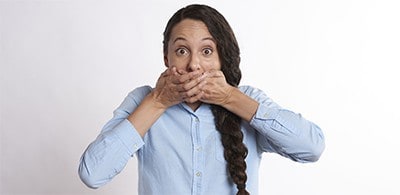Hiccups
A total of 68 years
Transcript
| It’s one of the most common medical occurrences, capable of striking anyone at any time, at any age. But don’t worry, it’s not fatal and the symptoms usually last only a few minutes. Hiccups are involuntary contractions of the diaphragm, the muscle that separates your chest from your abdomen and plays an important role in breathing. Each contraction is followed by a sudden closure of your vocal cords, which produces the characteristic “hic” sound. No one knows exactly what causes hiccups and they often start for no apparent reason. They most often disappear after a few minutes but in rare cases, hiccups can last for days, weeks or even months. Hiccups are common and normal in newborns and infants. The longest recorded attack of hiccups occurred when Charles Osborne of Anthon, Iowa, started hiccupping in 1922. He was unable to find a cure, and continued hiccupping until 1990, a total of 68 years or roughly 430 million hiccups.
Common triggers
Transcript
| It remains unknown why hiccups happen although researchers believe it has something to do with irritation of the nerves in the brain that control the muscles of respiration, including the diaphragm. The most common triggers for hiccups are the consumption of carbonated or alcoholic beverages, eating too much or swallowing air while chewing gum or sucking on candy. Swallowing hot or irritating substances can lead to hiccups, but they can also be caused by a combination of laughing, talking, eating and drinking. Anxiety, stress and excitement have been associated with some cases of short-term and long-term hiccups. Some people develop hiccups after undergoing general anesthesia or after procedures that involve abdominal organs. Hiccups are also likely to occur during sudden temperature changes or when carbon dioxide levels in the blood decrease. Such a decrease can occur when a person hyperventilates.
Chronic cases
Transcript
| The clinical term for hiccups is singultus, a spasmodic affection of the diaphragm. Hiccups typically go away after a couple minutes. However, chronic hiccups last over two days and in rare cases, may continue for over a month. Hiccups that recur over long periods of time are also considered “chronic.” Chronic hiccups are not thought to be inherited. Most cases occur sporadically in people with no family history of the condition. Depending on how long the hiccups last, the affected person may become exhausted, dehydrated or lose weight due to interruptions in their sleep and normal eating patterns. Other complications may include irregular heart beat and gastroesophageal reflux. The exact underlying cause is often unknown. Some cases may be caused by surgery, certain medications or a variety of health problems such as brain and spinal cord abnormalities, psychological problems, conditions that irritate the diaphragm and metabolic diseases.
Blocking phrenic nerve
Transcript
| Hiccups that last more than 48 hours are considered chronic and should be taken seriously. A complete physical exam and a series of imaging studies, such as a chest X-ray or CT scan, may be performed to determine the underlying cause of the hiccups. During the physical, the physician will check the patient’s balance and coordination, muscle strength, reflexes and their sight and sense of touch. Certain medications have been found to be successful in treating long-term hiccups, including tranquilizers like chloropromazine and haloperidol and anticonvulsive agents like phenytoin and carbamazepine. If less invasive treatments aren’t effective, the physician may recommend an injection of an anesthetic to block the phrenic nerve to stop hiccups. Another option is to surgically implant a battery-operated device to deliver mild electrical stimulation to the vagus nerve. This procedure is commonly used to treat epilepsy, but it has also helped control persistent hiccups.
Home remedies
Transcript
| There are a number of home remedies for treating a brief case of the hiccups but most cases go away without any kind of treatment. Most of the methods involve ways of raising the level of carbon dioxide in the blood, including holding your breath and breathing deeply into a paper bag. Other methods are done to try to stimulate the vagus nerve, which runs from the brain to the stomach. These can range from drinking water quickly, swallowing dry bread or crushed ice, even gently pulling on your tongue or rubbing your eyeballs. Some will tell you that putting a teaspoon of peanut butter in your mouth and holding it for a few seconds before swallowing it without chewing is the best way to stop hiccupping, as the gooey consistency interrupts the breathing pattern when you try to swallow it. Most of these remedies do not work or are only slightly effective. However, because they are typically safe and simple to do, there is no harm in trying them.
Trusted by thousands of listeners every week, T. Glenn Pait, M.D., began offering expert advice as the host of UAMS’ “Here’s to Your Health” program in 1996. Dr. Pait began working at UAMS in 1994 and has been practicing medicine for over 20 years.
